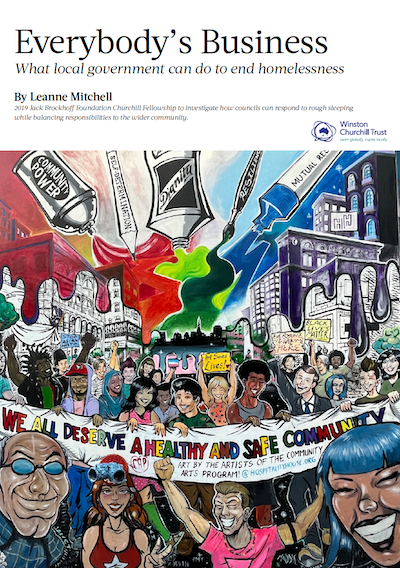Why local councils are the missing link in Australia's efforts to end homelessness
Homelessness in Australia is getting worse. It’s no longer just city centres where people are forced to sleep rough, live in their cars or rely on temporary shelter. The most recent census shows outer suburbs and regional areas are feeling housing pressures like never before.
More often than not, communities in these areas just don’t know what to do. Increasingly, residents are asking small, stretched local councils to go beyond their traditional responsibilities of rates, roads and rubbish and do more to tackle homelessness.
Yet local government lacks the mandate or the money to do so. Often, the only tool at local councils’ disposal is enforcement of local laws on behaviour in public places.
And when councils do get involved in the problem of homelessness, it’s often too late. They are reacting when homelessness has reached crisis point, instead of working to prevent it.

Now, with the federal government developing Australia’s first National Housing and Homelessness Plan, there is growing recognition that state and federal governments must give their local counterparts a seat at the table. My new report on what local government can do to end homelessness suggests councils — more than 500 of them across the country — could be the missing link in efforts to solve the homelessness crisis.
As the closest level of government to the people, councils have a unique perspective on homelessness that other levels of government are just too far away to see. Executed properly, this national plan could be the biggest opportunity we have ever seen to not only address homelessness, but also for local councils to help prevent the problem at its roots.
Housing everyone isn’t a simple task
The causes and manifestations of homelessness are complex. We know from experience that it can’t be “fixed” by the action of one group. Collaboration in key.
We also know Australia needs more social and affordable housing. As of June 2022, there were 174,624 households on waiting lists for public housing, 13,724 for Indigenous housing and 41,906 for community housing. And the waiting lists don’t include everyone who needs housing.
But houses can’t be built overnight. Even with the best efforts to increase the supply of social housing, we will likely remain in deficit for a long time. This is why we need local government involvement to prevent homelessness in the first place.
Yet too often we see reluctant councils explaining that homelessness is not their issue to solve. But, when we see it on local streets, in public parks and other shared spaces, this is a flimsy argument.

Read more: 'Getting onto the wait list is a battle in itself': insiders on what it takes to get social housing
We can learn from the successes overseas
Prevention is tricky. It takes many partners and many types of effort to implement, and it is difficult to measure. But, as my report shows, we can learn from the successful efforts of local governments overseas.
For example, in less than ten years, Newcastle City Council in the UK has prevented homelessness in more than 24,000 households. It has achieved this by working with local government workers and services to identify the triggers leading to homelessness and the opportunities to intervene before a person loses their home.
And in US cities, including San Francisco, Washington DC and Baltimore, social workers and people with past experience of homelessness, mental ill-health and drug and alcohol use are successfully working in public libraries to help people at risk access support and services.
Identifying potential homelessness before it turns into crisis is something that well-connected and informed Australian council workers can do too. Working deeply in communities, they often know their customers and can see early warning signs.
Concerted efforts are needed to educate local council workers so they know how to connect into specialist services that might help someone find housing, get emergency funds to cover bills, or access health services. These actions could stop homelessness before it happens.
Read more: Councils' help with affordable housing shows how local government can make a difference
But, first, councils need to be part of the plan
The federal government seems to have taken on board recommendations from the 2021 parliamentary inquiry into homelessness in Australia and identified local government as an untapped resource and partner.
A national plan that recognises and defines the unique contribution that local councils can make to preventing homelessness, and puts some money behind it, could be a game-changer.
Local government does not have to be the ambulance at the bottom of the cliff, or the cleaning crew.
If councils are truly recognised, ready and resourced to take on this role in preventing homelessness, it might also reduce the amount of social, temporary and emergency housing needed further along the line. It might even bring about an end to homelessness in Australia.
This article is republished from The Conversation is the world's leading publisher of research-based news and analysis. A unique collaboration between academics and journalists. It was written by: Leanne Mitchell, Charles Sturt University.
Read more:
Leanne Mitchell receives funding from the Winston Churchill Trust (Australia)


